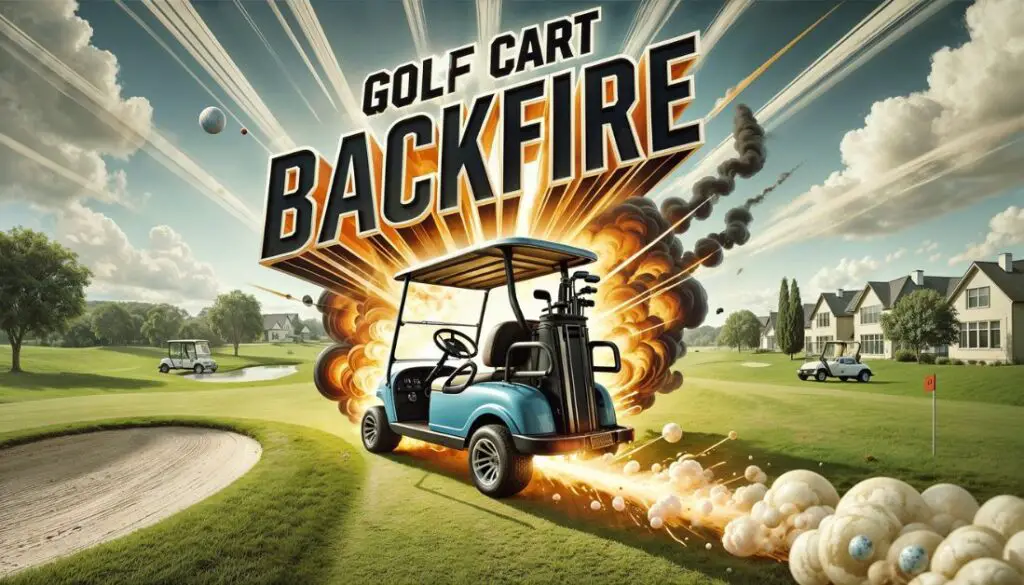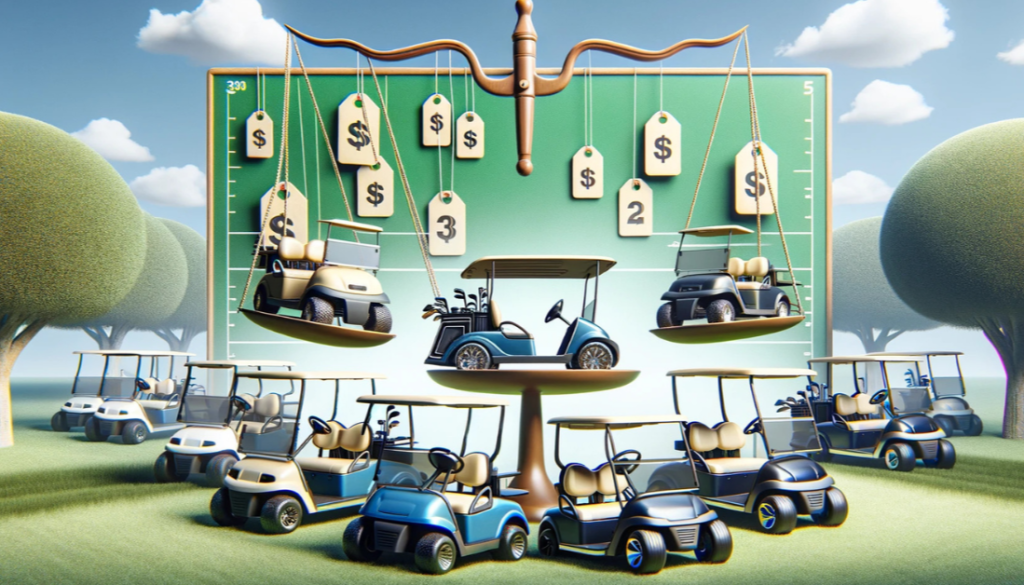If your golf cart backfires, you know how frustrating and even a little embarrassing it can be. That loud pop can startle you, and it might have you wondering if something is seriously wrong with your cart. You’re not alone—this is a common issue. In fact, a lot of golf cart owners experience backfiring at some point, and according to some surveys, nearly 1 in 10 golf cart owners have dealt with it at some point. But the good news is, it’s usually not as bad as it sounds. Let’s dive into why does my golf cart backfire and how you can fix it, so you can get back to enjoying your game without those unwanted explosions.
Table of Contents
ToggleWhat Should You Do If Your Golf Cart Starts Backfiring?
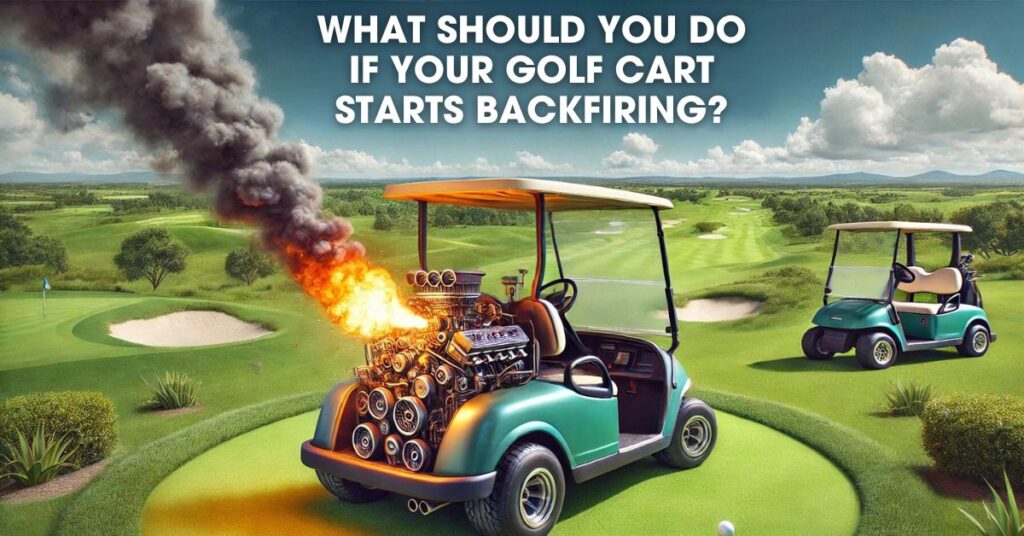
Maintaining calm is the first thing to do if your golf cart backfiring. Even while the loud noise is surprising, it doesn’t usually indicate a serious problem. The cart needs to be safely stopped is the next step. If you’re on the course, go to a location where you won’t disrupt the progress of other players. After coming to a stop, switch off the golf cart’s engine and give it some time to cool down.
Once cooled, review the fundamentals. Verify that there is enough fuel in the vehicle by looking at the level. Backfiring may be caused by outdated or poor gasoline. Examine the spark plugs after that. They may be the cause if they are worn out or unclean. Also, ensure the filter is free of any dirt or dust to ensure proper airflow. If it is not, then the air supply to your golf cart engine may be not enough causing it to backfire.
If you’re comfortable with basic maintenance, you can also check the carburetor and the exhaust system These parts are capable of backfiring due to loose connections or blockages.
It’s essential to speak with an expert, though, if you’re not sure what’s causing the backfire or how you can fix it. Continuing on with a backfiring cart could be even more dangerous. You can save a larger repair fee later on by having it looked out as soon as possible. Golf carts frequently backfire due to a few common difficulties that we’ll discuss in the next section.
Main Causes Of Golf Cart Backfires
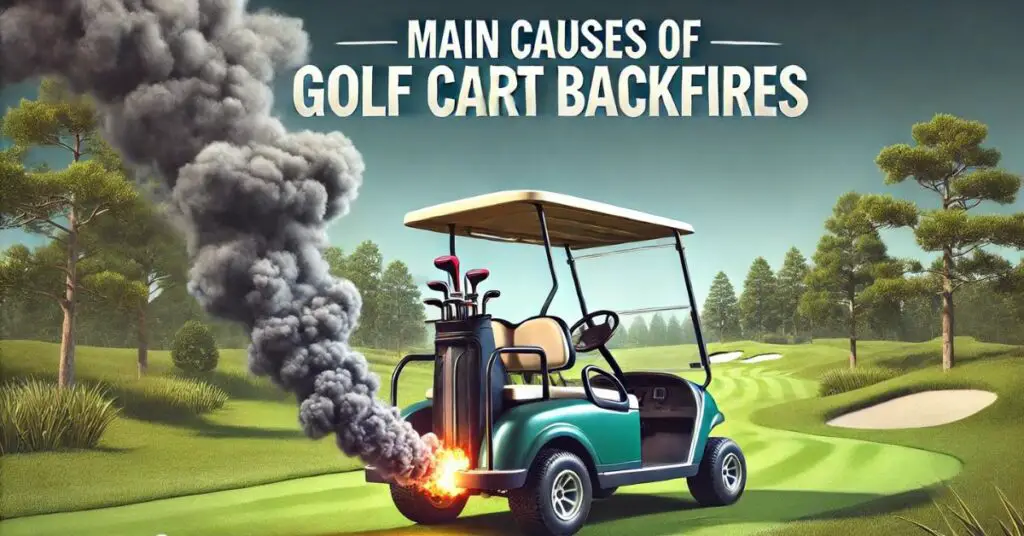
Understanding the primary causes of golf cart backfires is essential when handling them since it can help identify the problem and speed up a solution. Let’s examine the typical culprits who might be responsible for this issue.
Fuel System Issues
Fuel system issues are among the most common root causes of backfires. An incomplete combustion may come from an overly rich or weak fuel combination, which might lead to a backfire. This could occur if the carburetor has a problem or if the fuel injectors are unclean or broken. Fuel that is outdated or impure might potentially increase this issue. Backfires can be minimized by using new gasoline and maintaining a clean fuel system.
Also Explore: Everything You Need to Know About Golf Cart Oil Change
Throttle Did Not Close Properly
After you release the accelerator, if your throttle isn’t closing all the way, more air may enter the engine. Unburned fuel ignites in the exhaust system as a result of the extra air mixing with it, creating a backfire. When the throttle doesn’t close as it should, it’s often due to loose or sticky throttle cables. This problem can be avoided with routine maintenance that ensures the throttle mechanism is operating smoothly.
Too Much Carbon On Pistons
Carbon has the ability to build up on pistons after a while if the engine is not in the best state it can be in. This carbon builds up might cause of the appearance of hot spots which could lead to the combustion of the air-fuel mixture. This often leads to backfiring when this happens. One has to clean one’s engine regularly and use good quality fuel so that there is little or no carbon deposit on the pistons.
Carbon Build Up In The Muffler
Also, like the carbon build up that is found in the pistons, there is the possibility that it will form and accumulate in the muffler. When this happens, it is possible that exhaust gasses may be unable to escape with the needed efficiency, this causes pressure differences which enable backfires. Therefore, making routine checks on the muffler and washing it, or replacing it, is crucial for the smooth running of the golf cart.
Engine Problems
More Serious engine problems, such as worn valves or timing issues, can also cause backfires. In case if the valves fail to seal properly, fuel may escape into the exhaust system and cause a backfire. Similarly, poor timing will misfire the spark plugs making them fire at the wrong time, igniting the fuel mixture too early or too late. These issues often require professional diagnosis and repair.
Exhaust System Blockages
Blockages in the exhaust system, such as a clogged catalytic converter or muffler, can cause back pressure to build up. This backpressure can force unburned fuel into the exhaust system, where it ignites and causes a backfire. Ensuring that the exhaust system is free of blockages and functioning correctly is key to preventing backfires.
Improper Tuning Or Adjustments
Last but not least, in correct tuning or adjustments of the carburetor, sparking plugs or the timing could lead to backfiring. Another problem is that the engine can be tuned incorrectly either too rich or too lean, and in both cases, backfires are possible. One should ensure the golf cart receives daily maintenance and checkups from a professional technician if the cart is to avoid backfires.
Knowing these major causes helps in identifying and solving a backfiring golf cart easily. In the next Part, we shall explain how you can fix such problems and get your cart working as it should – quietly and effectively.
Explore More: Golf Cart Etiquette Explained: Do’s & Don’ts For Every Round
How Can I Prevent Backfires In My Golf Cart?
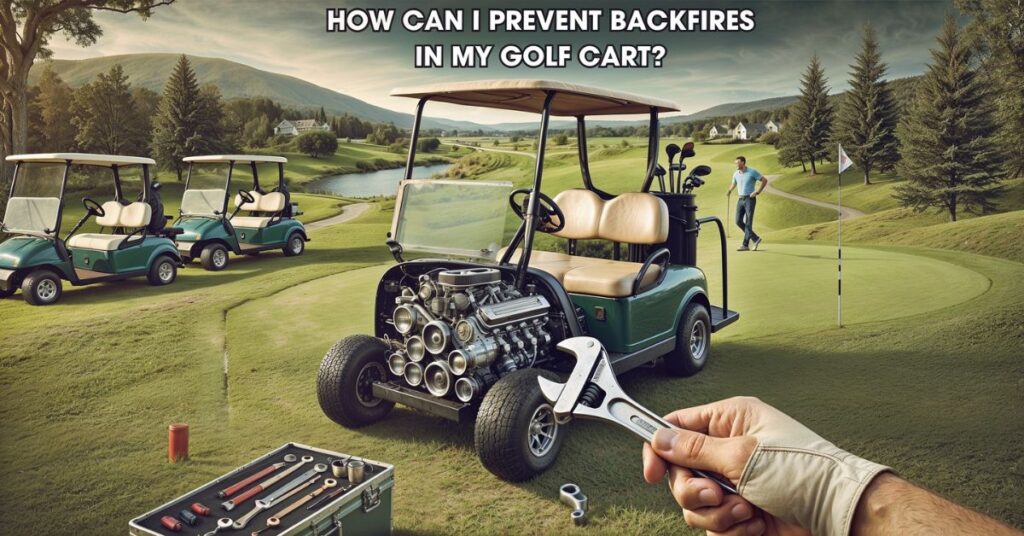
Preventing backfires in your golf cart is all about regular care and attention to detail. By addressing potential issues before they escalate, you can keep your cart running smoothly and avoid those annoying backfires. Here are some key steps to help you prevent backfires.
Regular Maintenance
Prevention of backfire, more than anything, it is crucial to check the maintenance of your golf cart regularly. Regular health checks of the engine, fuel supply, and exhaust system may help someone to identify early any signs of a developing problem. Other than following the manufacturer’s maintenance schedule, the performance of routine tests guarantees that all parts are functioning properly. This consists of washing the filter and or replacing it, checking on the belts, and checking for wear and tear of other important parts.
Use High-Quality Fuel
The quality of the fuel to be used in the golf cart has a great impact on the overall performance of the cart. Ineffective combustion may also be occasioned by the use of low-quality or stale fuel, which may result in backfires. One should always use new, good-quality gasoline for the reason that an engine requires the right mixture of it. Effective enough in avoiding congestion of carbons which is one of the major causes for backfires.
Proper Throttle Plate Adjustment
A throttle plate controls the amount of air which is entering in the engine. When If it’s not adjusted correctly, it may allow in either more or less air than it should, making the engine work rough, and even leading to backfires. To avoid backfires, it is essential to ensure that the throttle plate is correctly set to enable consistent air-fuel ratios that will be expected.
Check For Leaks
Leaks of fuel or the exhaust systems can cause factors that lead to backfires. Fuel leaks as a result may make the engine run on low fuel while exhaust leaks allow the the unburnt fuel to enter the exhaust system and causing backfires. Make it a practice to check regularly your golf cart for any signs of leakage and repair it immediately to prevent backfires.
Inspect The Spark Plugs
Spark plugs are essential for igniting your engine’s gasoline mixture. Worn or unclean spark plugs can cause incomplete combustion and backfires. Regularly examining and changing spark plugs as needed can guarantee that they fire properly and your engine runs smoothly.
Avoid Overheating
That way, overheating may lead to another problem such as backfires among others. If the temperature in the engine increases to an optimum level, then it can cause pre-ignition in which the fuel mixture burns before the spark plug has fired or ignited it. This can backfire and place extra pressure on your engines which is not required at all. As for overheating, just make sure that the cooling system is functioning, and don’t push your cart in hot weather.
Adjust The Ignition Timing
Timing of ignition is important for ensuring the spark plugs deliver their service at the appropriate time. If the timing is off, the fuel mixture ignites early or too late later; this leads to backfires. This means that during your general checking, you should check the ignition timing frequently and correct it to keep your engine running efficiently.
Golf cart backfire issues can often be traced to a faulty microswitch or problems with the carb, and it’s important to check the pedal mechanism, especially on EZGO, Club Car, or Yamaha models, to ensure smooth operation
Conclusion
In conclusion, dealing with golf cart backfires can be frustrating, but it’s usually a fixable issue. Understanding the causes—whether it’s a problem with the fuel system, throttle, carbon buildup, or engine timing—can help you address the problem quickly. Proper maintenance is the best defense against backfires, with insistence on using high octane fuels, and paying attention to critical parts such as the throttle plate, spark plugs, and exhaust.
By doing this you will be able to find the main cause and correct it before it creates any problem, therefore enjoying your golf cart without any loud interruptions on the course. However, if you are one of those people who’s facing a backfire, know that it is usually a universal problem that has a straightforward solution.
FAQ's
Your golf cart may have caught fire due to several reasons:
- Electrical Issues: Faulty wiring or electrical shorts can spark a fire.
- Fuel Leaks: Due to contact with hot components of the engine fuel leakage is always dangerous because it can easily catch fire quickly.
- Overheating: Excessive heat from the engine or a malfunctioning cooling system can cause a fire.
- Battery Problems: Faulty or damaged batteries can overheat or short-circuit, leading to a fire.
- Improper Maintenance: Failing to check or repair the cart often may create dangerous inherent conditions.
To save your cart from a backfire situation you need regular maintenance and any defective part should be repaired early enough.
No, engine backfire is not normal. It indicates a problem that needs to be addressed, such as issues with the fuel system, ignition timing, or engine components.
The air-fuel mixture igniting outside the combustion chamber is what causes an ignition backfire. Incorrect ignition timing, a broken spark plug, or an unbalanced fuel mixture are all possible causes of this.

